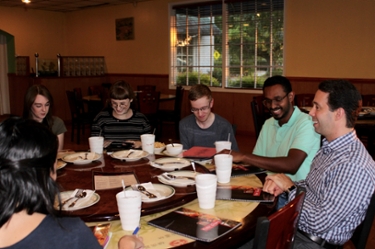Reading Groups Provide More Than Lively Discussion for New Students
It’s a rare sight to find busy law students taking on extra reading assignments outside of class. Yet, that's exactly what almost two-thirds of the students in William & Mary’s first-year class did as they navigated their first weeks of school.
On an early October evening, eight of these eager students gathered at a local Chinese restaurant ready to discuss the book they had selected over the summer. From 13 possible options, this group of 1Ls had chosen “Pain Killer: An Empire of Deceit and the Origin of America’s Opioid Epidemic.” Written by journalist Barry Meier, the book was the first to expose the growing abuse of OxyContin across the country.  Professor Adam Gershowitz, the Law School’s Associate Dean, led the group’s discussion on the book and the nation’s opioid crisis, pushing them to think like lawyers. Amid bites of Asian cuisine and sips of cold drinks, students passionately delved into examining culpability and thinking about legislation to combat opioid addiction. Professor Gershowitz, along with Professor Stacy Kern-Scheerer, teach “Health, Crime, and the Opioid Crisis,” a new course that debuted this fall.
Professor Adam Gershowitz, the Law School’s Associate Dean, led the group’s discussion on the book and the nation’s opioid crisis, pushing them to think like lawyers. Amid bites of Asian cuisine and sips of cold drinks, students passionately delved into examining culpability and thinking about legislation to combat opioid addiction. Professor Gershowitz, along with Professor Stacy Kern-Scheerer, teach “Health, Crime, and the Opioid Crisis,” a new course that debuted this fall.
While students left with new thoughts on tackling the crisis, the evening provided more than a lively discussion.
“Most of us actually didn’t know each other and bringing us together over a common interest made for an easy and interesting way to get to know one another,” said Meg McCarthy, a student in Gershowitz’s group.
She also enjoyed how the reading group’s focus went beyond the book, with Professor Gershowitz checking in on everyone’s adjustment to law school and asking about their challenges so far. Students shared common fears, from dealing with the workload and school activities, to struggling to get used to life without full-time employment.
“It was nice to hear that people who I didn’t even know and were in different classes were going through the same experience,” McCarthy added.
Gershowitz was among 13 professors, including Dean Davison Douglas, who led the reading groups this fall. Topics in the faculty-selected books ranged from freedom of speech and terrorism, to poverty and profit. One professor, as an alternative to a book, chose a podcast about a man on death row. The program started in 2015, becoming popular with students and professors as a way to engage outside the Law School.
Incoming first-year students received an email over the summer inviting them to participate. After students selected their groups, professors contacted them to arrange a meeting date. Most groups met in a restaurant or at a professor's home.
“It’s a great way to get to know our new students,” said Gershowitz, who advised students on the importance of being well-read and well-rounded as opposed to simply reading assigned class material during law school.
1L Kaila DeSaix choose the book “Evicted: Poverty and Profit in the American City,” and Professor Laura Heymann led her group’s discussion. DeSaix said she signed up for the reading program because it meant she could engage with students and a professor with similar interests in a casual small setting.
“This was a great opportunity to meet other students and have a legal discussion without the pressure of being in class,” DeSaix said.
The 2018 list of books and faculty discussion leaders included:
“Terror and Consent: The Wars for the Twenty-first Century” (Professor David E. Boelzner);
“Factfulness: Ten Reasons We're Wrong About the World - and Why Things Are Better Than You Think” (Professor Anna Perez Chason);
“Speak Freely: Why Universities Must Defend Free Speech” (Dean Davison Douglas);
“Pain Killer: An Empire of Deceit and the Origin of America's Opioid Epidemic” (Professor Adam Gershowitz);
“The Terror Presidency: Law and Judgment Inside the Bush Administration” (Professor Tara Leigh Grove);
“Just Mercy: A Story of Justice and Redemption” (Professor Erin Hendrickson and Professor Jennifer Stevenson);
“ Evicted: Poverty and Profit in the American City” (Professor Laura Heymann) ;
“The Immortal Life of Henrietta Lacks” (Professor Stacy Kern-Scheerer);
“Free Speech on Campus” (Professor Allison Orr Larsen);
Season Two, “In the Dark” (Podcast) (Professor Mason Lowe);
“The Return of Martin Guerre” (Professor Tom McSweeney); and
“Enlightenment Now: The Case for Reason, Science, Humanism, and Progress” (Professor Cynthia Ward).
About William & Mary Law School
Thomas Jefferson founded William & Mary Law School in 1779 to train leaders for the new nation. Now in its third century, America's oldest law school continues its historic mission of educating citizen lawyers who are prepared both to lead and to serve.